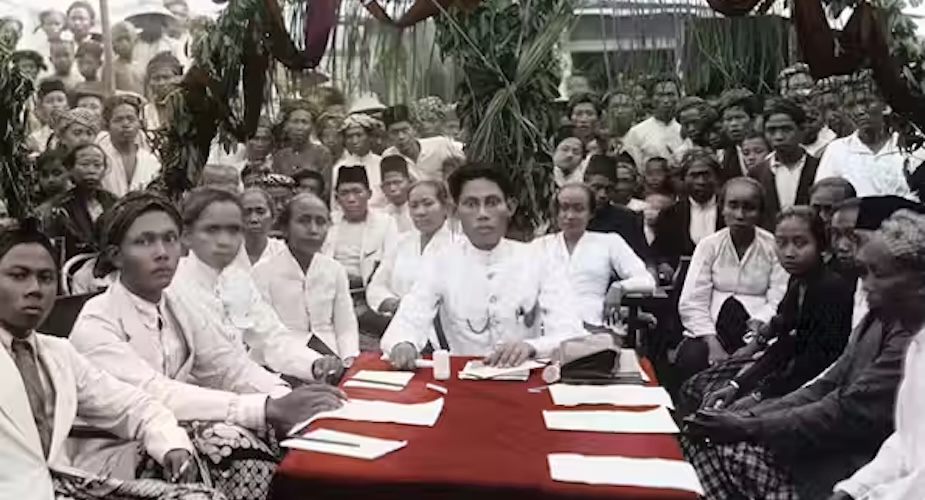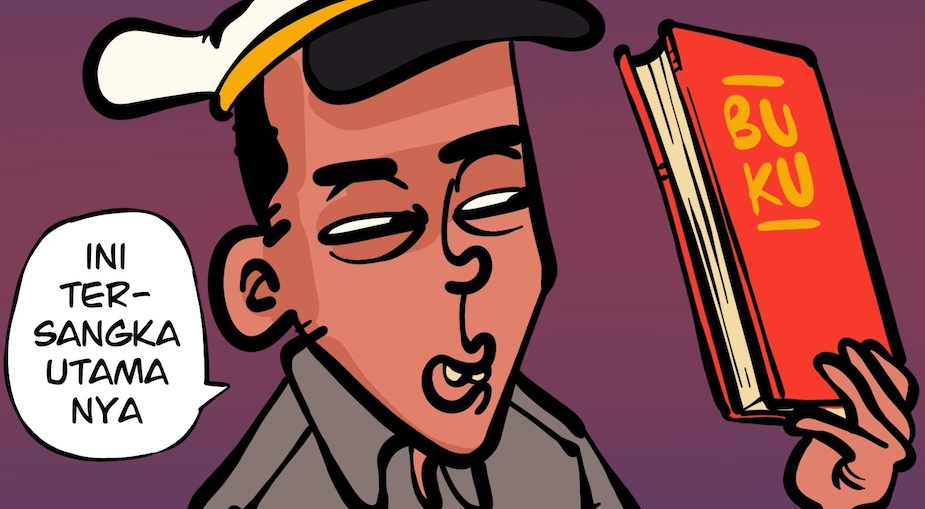To Jakarta, he is an enigma. To the Madurese, he holds out hope for a better society. GERRY VAN KLINKEN goes to the grass-roots.
With his flowing robes, turban, and sharp tongue, Kiai Alawy Muhammad is an impressive figure. He is also a headache for Indonesia's secular central government. Jakarta likes to borrow his influence with the masses on the rocky and turbulent island of Madura, yet wants to yield nothing to his idea of a better society.
That idea combines more social justice with greater Islamic piety - neither of them evident priorities for a Jakarta elite more interested in retaining power and pursuing its lucrative business privileges. The late middle-aged Kiai Alawy encapsulates a key dilemma of Indonesian politics - how to retain the loyalty of the rural masses.
Resistance
Alawy's name burst into the headlines in September 1993. Even before land acquisition negotiations were complete, the insensitive regent of Sampang in Madura ordered surveyors in to measure up a new dam. Local landowners protested. The regent, a serving colonel, allowed the military to shoot, resulting in four deaths. Alawy verbalised local outrage so effectively that he became a national symbol of resistance against bureaucratic arbitrariness. And with success. The regent was eventually removed, and four soldiers court martialed.
Alawy strongly opposes government moves to secularise national politics. He leads the At-Taroqi Islamic school in Sampang, and is known as a member of Indonesia's largest Islamic organisation, Nahdatul Ulama, NU. In 1984 NU relinquished a formal role in politics and returned to its 1926 charter. While the government welcomed the decision, Alawy deplored it.
He also deplored it when the last remaining avenue for 'Islamic' politics was closed off in 1985. The United Development Party, PPP, formed at government behest out of several Islamic parties, excised religious references from its constitution and adopted Pancasila as sole basis. Alawy always backs suggestions to transform the PPP and the NU back into Islamic political parties.
Megawati
But Alawy also supports secular hero figures such as Megawati, whose theme of social justice is nationalist rather than Islamic. In 1994, ever compliant to government pressure, the PPP re-elected a chairman who (as one military man put it) would 'keep the PPP quiet'. In disgust, Alawy threatened to switch support to Megawati's PDI.
Despite his disillusionment with the PPP, Alawy this year accepted an invitation to become their election campaigner. 'PPP is the home of the Islamic congregation', he told enthusiastic crowds not just in Madura but all over East Java and even in Kalimantan. When the government forbade Qur'anic quotes in PPP election speeches, Alawy said defiantly: 'The Qur'an is our steadfast guide every moment of our lives'.
One PPP branch in Central Java opened its rallies to Megawati supporters, since Megawati had been removed from the PDI leadership. These rallies combined the powerful symbols of Islam and nationalism. The idea, they said, was Alawy's. It soon spread to Jakarta, where portraits of Megawati mixed with the green star of Islam at many rallies.
Alawy insisted that for Muslims to vote other than PPP was 'treason'. So much so that NU's chairman Abdurrahman Wahid, who does not support the PPP, declared Alawy could not possibly belong to the NU. NU members, Wahid said, were free to vote for any party they wished. This remark sparked an angry threat from Alawy followers to burn down NU's East Java headquarters.
The PPP campaign was militant. Among many riots was one in Pasuruan, East Java, on the last day of the campaign. Soldiers shot over a dozen people at the start of a rally at which Alawy was to speak.
Madura
It had hoped to do well in East Java, but Golkar defeated the PPP roundly even in Islamic heartlands like Madura. PPP supporters protested so vigorously against open abuses by government officials in Madura on the evening of election day that East Java's governor decided the better part of valour was to order a local re-run of the poll in Sampang.
PPP's Jakarta leadership had no taste for militancy after the brief campaign interval. Normally after an election, it quietly ignores its own most charismatic campaigners who pulled in the votes. Alawy does not intend the same should happen to him. He has grass-roots support to confront local officials who displease him, and will not be easy to eliminate.
Injustice
Had Jakarta been more serious about addressing social injustices, it could perhaps have drawn the Islamic sting of Kiai Alawy Muhammad and others like him in Indonesia's rural regions. Its inability to bridge a credibility gap on both counts resulted in an upsurge of violent protest sanctified with religious slogans in many places around the country. A local sense of community along ethnic and religious lines began to fill the vacuum left by crumbling leadership at the centre.
Gerry van Klinken edits Inside Indonesia.











